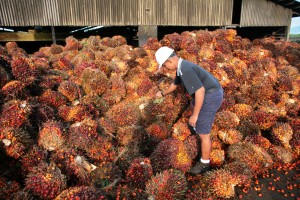Encouraging Greater Use of Sustainable Palm Oil

Dating back to the eighties, growing consumer concerns about health and diet have driven increased use of palm oil as an ingredient by European food manufacturers. Environmental issues have been fueling demand for palm oil sourced from certifiably sustainable sources.
Made from crushing palm fruits, palm oil is an edible vegetable oil used mainly for food applications. Palm oil and its fractions (such as olein and stearin) are used as cooking oil and as an ingredient for margarine, shortening, vanaspati/ghee, frying fat and cocoa butter equivalents. Palm kernel oil is used for both food and non-food purposes but primarily as a specialty fat used in applications including confectionery and coating fats. Palm oil is also used in non-food items like soap and cosmetics.
Advantages of Palm Oil
Because of its functionality, palm oil offers major benefits for food manufacturers. Palm oil provides structure and texture to many food products, and has good oxidative stability. For both these reasons it can be used in many solid fat formulations without the need for partial hydrogenation (hardening), thus providing a virtually trans free solution.

Total palm consumption in Europe is about 6 million tones. Total CSPO sales in 2011 were 2.5 million tones with the majority going to Europe.
Fuelled by growing consumer demand for natural ingredients and concern over trans fats, palm oil and its fractions have grown in popularity within the European and global food manufacturing industry.
A further advantage is that palm oil is the most efficient vegetable oil crop, with the highest yield per hectare, which makes it a relatively cheap vegetable oil. As an all-year round crop, palm oil is not reliant on single crop seasons, which helps maintain a high level of availability and its price attractiveness to food manufacturers.
“Palm oil is a very important ingredient because of its functional characteristics and versatility of application but also from an economic perspective. Palm oil is now used in almost 50% of the products in supermarkets, which also includes non-food items,” explains Caroline Sikking, sustainability manager of Cargill Refined Oils Europe. “At Cargill, we see continued strong global demand for palm oil and a strong interest in sustainable RSPO certified palm oil although take-up is not yet at the same levels as available certified volumes.”
Leading Role For Cargill
As one of the major suppliers of palm oil and palm kernel products, including stearin and olein and many different blends, to the European market, Cargill is playing an influential role in encouraging greater usage of sustainable palm oil. Cargill operates palm oil refineries in The Netherlands, Germanyand Belgium, which buy, refine, process, and market palm oil products to customers. The crude palm oil is sourced from Cargill’s own plantations as well as from other plantations and traders. Outside of Europe Cargill has refineries in the US, Malaysia and India.
Cargill has been a supporter of sustainable palm production for many years through its membership of the Round Table on Sustainable Palm Oil (RSPO) and its drive to support sustainable palm in its own operations. Cargill is also working with customers to help them understand the RSPO requirements to enable them to make the best choice to meet their business needs.
Sustainability Commitments
Sustainability is becoming an increasingly important issue to consumers. This is reflected in the growing number of European and global food manufacturers committing to source and use RSPO certified palm oil.
“Cargill believes palm oil should be produced sustainably and we are committed to working towards sustainable palm oil production,” says Caroline Sikking. “We fully support the RSPO process, which has developed principles and criteria and certification procedures to promote the growth and use of sustainable palm oil throughout the supply chain.”
She continues: “Cargill wants to play a leading role in working towards sustainable palm oil supply and use through the RSPO, and through our own actions. As such we have committed that the palm oil products supplied to our customers (excluding palm kernel oil products) in Europe, United States, Canada, Australia and New Zealand will be RSPO certified and/or originated from smallholder growers by 2015. This commitment will be extended across all our oil and trading businesses to cover 100% of our palm oil products and all customers worldwide – including China and India – by 2020. We are also encouraging our third party suppliers to join RSPO and become certified, and it is our hope that all oil palm plantations become RSPO-certified.”
Customer-focused
Cargill is currently supplying food manufacturers with RSPO certified palm oil. This includes offering customers the option to utilise all the physical chain of custody trading models authorised by the RSPO (‘segregation’ and ‘mass-balance’) and also offering customers certificates depending on their preferences.
“We’re already working with customers to understand their current and their future needs so we can find the best approach to provide them with RSPO certification and to make their supply chains more sustainable and enable them to incorporate sustainable ingredients in their products,” she explains. “We are also encouraging our third party suppliers to become RSPO members and become certified.”
As a vertically integrated palm oil producer and supplier, Cargill is well placed to encourage stakeholders within the supply chain to adopt sustainable practices. However, transition to a fully certified sustainable supply chain will take time.
“The key food manufacturers are focusing on their own development plans with regard to sustainable palm oil. There is a large volume of certified palm oil available but that is, of course, crude palm oil. To further process the crude oil requires a ‘segregated’ approach or a ‘mass balance’ approach, which is a very good intermediate step,” she remarks.
Adopting a mass balance approach, where a proportion of sustainable palm oil is mixed with classic palm oil, makes it more difficult for food manufacturers to communicate their ‘green’ credentials to consumers, although it allows for a mixed claim and use of the RSPO trademark.
Co-operation Within the Supply Chain
“Of course, if we can increase demand and increase the volumes of crude sustainable palm oil to the European market, then obviously we will be able to convert complete refineries. But we are not at that stage yet,” she adds. “What many food manufacturers want is to have segregated palm oil available. While that is feasible for straight refined palm oil it is not possible for all the different products derived from palm and/or palm kernel. We can only achieve that transformation by working together within the whole supply chain – growers, refiners, traders and food manufacturers.”
In addition to palm oil, Cargill is also supporting and encouraging sustainable production in other areas of its supply chain including cocoa, soy, sugar, beef and cotton.

As one of the major suppliers of palm oil and palm kernel products to the European market, Cargill is playing an influential role in encouraging greater usage of sustainable palm oil.
“We are putting in place our own actions to encourage the adoption of better agricultural and environmental practices, promote better and safer labour practice and support improvements to farming communities,” points out Caroline Sikking. “We recognise we cannot do this alone and that’s why we are working through direct partnerships – and multi-stakeholder groups like the RSPO – with governments, NGOs, industry partners and local communities to find sustainable ways to tackle key issues.”
New Product Development
An example of Cargill’s endeavors in this respect is the group’s cocoa and chocolate business’s newly launched range of sustainable coatings and fillings for the European market, offering UTZ Certified cocoa powder and RSPO certified palm and palm kernel products. “It’s another step in Cargill’s ambition to continue to bring sustainable products to market,” she says.
Cargill specialises in helping food and beverage manufacturers drive growth through new product innovation, increasing supply chain efficiency, optimising product formulation and managing commodity price risk. Another recent introduction is TasteWise™, Cargill’s new revolutionary solution that enables manufacturers to deliver better tasting reduced calorie beverages to customers. TasteWise™ is the culmination of years of scientific research and features a new way to optimise taste by better balancing texture, flavour and sweetness. TasteWise™ also features Cargill’s Truvia® stevia leaf extract, which is attracting high consumer interest.
“Both new products illustrate how Cargill is uniquely positioned to work from a holistic perspective and help its customers successfully deliver great-tasting products,” Caroline Sikking concludes.



































